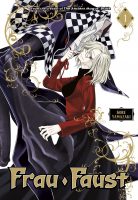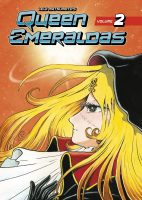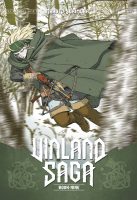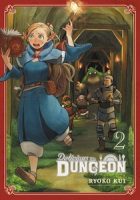My News and Reviews
September has ended and October has begun, but there’s still a little time left to enter the most recent manga giveaway at Experiments in Manga! The results will be announce on Wednesday, so be sure to get your comments in for a chance to win the first volume (actually, I think it may even be the first half) of Takashi Yano and Kenji Oiwa’s Assassin’s Creed: Awakening. For this giveaway, I’m interested in learning more about everyone’s favorite pirate characters in manga. Otherwise, it was once again a fairly quiet week here at the blog. It’s been a while since I’ve last mentioned any of the Kickstarter’s that have caught my eye, but Matthew Meyer’s campaign to continue his series of illustrated yokai guides launched last week. The Book of the Hakutaku: A Bestiary of Japanese Monsters will be the third volume following The Night Parade of One Hundred Demons: A Field Guide to Japanese Yokai (which I’ve previously reviewed) and The Hour of Meeting Evil Spirits: An Encyclopedia of Mononoke and Magic. I really love these books, and the artwork is fantastic.
Quick Takes
 Love & Lies, Volume 1 by Musawo. In general, I don’t tend to gravitate towards high school romances, but I am a sucker for utopian and dystopian fiction, so when those two genres mix I can’t help but want to give the resulting story a try. Love & Lies is set in Japan in the near future. In response to the crisis of an extreme decline in population, the government has implemented a program which assigns marriage partners based on their genetic makeup and social circumstances so that any children born will be healthy, skilled, contributing members of society. Once both partners have turned 16, they receive a notice from the government revealing their identities to each other for the first time. Who they may or may not truly love isn’t really taken into consideration, but it also seems that program may be susceptible to corruption. I find the premise of Love & Lies to be very interesting; it has great potential to explore the nature of love and personal relationships in a dramatic and engaging way. When the entire purpose of marriage has become a government-funded reproduction program, the impact on society and its people will be tremendous. I also especially appreciate that Love & Lies includes at least one character who isn’t heterosexual seeing as a marriage program of this type would have particularly drastic social implications for a person who is queer in some way.
Love & Lies, Volume 1 by Musawo. In general, I don’t tend to gravitate towards high school romances, but I am a sucker for utopian and dystopian fiction, so when those two genres mix I can’t help but want to give the resulting story a try. Love & Lies is set in Japan in the near future. In response to the crisis of an extreme decline in population, the government has implemented a program which assigns marriage partners based on their genetic makeup and social circumstances so that any children born will be healthy, skilled, contributing members of society. Once both partners have turned 16, they receive a notice from the government revealing their identities to each other for the first time. Who they may or may not truly love isn’t really taken into consideration, but it also seems that program may be susceptible to corruption. I find the premise of Love & Lies to be very interesting; it has great potential to explore the nature of love and personal relationships in a dramatic and engaging way. When the entire purpose of marriage has become a government-funded reproduction program, the impact on society and its people will be tremendous. I also especially appreciate that Love & Lies includes at least one character who isn’t heterosexual seeing as a marriage program of this type would have particularly drastic social implications for a person who is queer in some way.
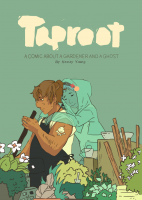 Taproot: A Comic about a Gardener and a Ghost by Keezy Young. I first encountered Young’s work through the ongoing webcomic Yellow Hearts which joined Sparkler Monthly‘s lineup of online comics relatively recently. Part of what I love about Yellow Hearts is Young’s gorgeous illustrations and use of color as well as the natural inclusion of queer characters in the story. Taproot is Young’s debut graphic novel and it, too, has what I’ve come to love and expect from the creator’s other comics. The graphic novel has a great amount of depth to it, more than the rather simple, straightforward subtitle would seem to imply. Hamal is young man who can see ghosts, an ability which has made it difficult for him to find acceptance from others. At least from those who are living. Many of the ghosts, on the other hand, are drawn to and quite like Hamal; Blue has even fallen in love with him, although being incorporeal presents a few challenges. But there’s an even greater problem that the two of them must face–the very existence of the local ghosts is being threatened by a frighting supernatural disturbance. There is a sense of loneliness and melancholy to be found in Taproot, but the comic is also incredibly heartwarming and endearing. Taproot is a sweet and touching queer romance with beautiful artwork, making it something that’s extremely easy to recommend.
Taproot: A Comic about a Gardener and a Ghost by Keezy Young. I first encountered Young’s work through the ongoing webcomic Yellow Hearts which joined Sparkler Monthly‘s lineup of online comics relatively recently. Part of what I love about Yellow Hearts is Young’s gorgeous illustrations and use of color as well as the natural inclusion of queer characters in the story. Taproot is Young’s debut graphic novel and it, too, has what I’ve come to love and expect from the creator’s other comics. The graphic novel has a great amount of depth to it, more than the rather simple, straightforward subtitle would seem to imply. Hamal is young man who can see ghosts, an ability which has made it difficult for him to find acceptance from others. At least from those who are living. Many of the ghosts, on the other hand, are drawn to and quite like Hamal; Blue has even fallen in love with him, although being incorporeal presents a few challenges. But there’s an even greater problem that the two of them must face–the very existence of the local ghosts is being threatened by a frighting supernatural disturbance. There is a sense of loneliness and melancholy to be found in Taproot, but the comic is also incredibly heartwarming and endearing. Taproot is a sweet and touching queer romance with beautiful artwork, making it something that’s extremely easy to recommend.
 That Time I Got Reincarnated as a Slime written by Fuse and illustrated by Taiki Kawakami. There seems to be a preponderance of manga series right now with the underlying conceit of a person dying and then being reincarnated in some sort of fantasy world. I have read a few of these series, so I haven’t been completely avoiding them, but I’ve not really been seeking them out, either, having experienced genre-fatigue by proxy. However, That Time I Got Reincarnated as a Slime still managed to pique my interest simply because it sounded like such a ridiculous spin on what has become such a well-worn story. And I’ll admit, the first volume of the That Time I Got Reincarnated as a Slime manga is surprisingly entertaining. The protagonist of the series also happens to be a 37-year-old man, which isn’t the most common in translated manga. Of course, as can be safely assumed from the title, he soon dies only to start life again as a slime, one of the lowliest monsters there is. Mikami accepts this turn of fate pretty quickly and focuses his attention on gaining the ability to verbally communicate with the adventurers and other creatures he encounters. What he doesn’t realize is that he’s essentially been leveling up the entire time he’s been trying to find a way to talk and has unintentionally become one of the most powerful monsters in the area, inadvertently gaining a large following in the process.
That Time I Got Reincarnated as a Slime written by Fuse and illustrated by Taiki Kawakami. There seems to be a preponderance of manga series right now with the underlying conceit of a person dying and then being reincarnated in some sort of fantasy world. I have read a few of these series, so I haven’t been completely avoiding them, but I’ve not really been seeking them out, either, having experienced genre-fatigue by proxy. However, That Time I Got Reincarnated as a Slime still managed to pique my interest simply because it sounded like such a ridiculous spin on what has become such a well-worn story. And I’ll admit, the first volume of the That Time I Got Reincarnated as a Slime manga is surprisingly entertaining. The protagonist of the series also happens to be a 37-year-old man, which isn’t the most common in translated manga. Of course, as can be safely assumed from the title, he soon dies only to start life again as a slime, one of the lowliest monsters there is. Mikami accepts this turn of fate pretty quickly and focuses his attention on gaining the ability to verbally communicate with the adventurers and other creatures he encounters. What he doesn’t realize is that he’s essentially been leveling up the entire time he’s been trying to find a way to talk and has unintentionally become one of the most powerful monsters in the area, inadvertently gaining a large following in the process.
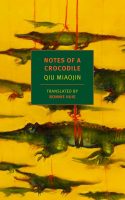 Notes of a Crocodile by Miaojin Qiu. So far, only two of Qiu’s long-form works have been translated into English. Last Words from Montmarte, originally published posthumously after the author’s suicide at the age of twenty-six, was released in translation in 2014 and the English-language edition of Notes of a Crocodile, described as a cult classic of queer Taiwanese literature, was more recently released in 2017. Notes of a Crocodile is also one of Qiu’s most highly acclaimed and well-known works. The novel is about a small group of lovesick and psychologically troubled queer college students coming of age in Taipei in the late 1980s. The narrative unfolds as a series of notebooks which contain a combination of diary-like entries, letters between friends and lovers, and fragments of a surreal story about crocodiles posing as humans, in part a metaphor for those who have to live hidden lives. The narrator of Notes of a Crocodile is nicknamed Lazi, a young lesbian woman with self-destructive tendencies who is struggling to come to terms with her sexuality. The women she falls obsessively in love with and their doomed romances feature prominently as do the tumultuous and fraught relationships between her and her small group of extremely close friends. Notes of a Crocodile is a beautiful work but it is also filled with pain, desperation, and longing–the novel resonated very strongly with me and I hope to read more of Qiu’s work.
Notes of a Crocodile by Miaojin Qiu. So far, only two of Qiu’s long-form works have been translated into English. Last Words from Montmarte, originally published posthumously after the author’s suicide at the age of twenty-six, was released in translation in 2014 and the English-language edition of Notes of a Crocodile, described as a cult classic of queer Taiwanese literature, was more recently released in 2017. Notes of a Crocodile is also one of Qiu’s most highly acclaimed and well-known works. The novel is about a small group of lovesick and psychologically troubled queer college students coming of age in Taipei in the late 1980s. The narrative unfolds as a series of notebooks which contain a combination of diary-like entries, letters between friends and lovers, and fragments of a surreal story about crocodiles posing as humans, in part a metaphor for those who have to live hidden lives. The narrator of Notes of a Crocodile is nicknamed Lazi, a young lesbian woman with self-destructive tendencies who is struggling to come to terms with her sexuality. The women she falls obsessively in love with and their doomed romances feature prominently as do the tumultuous and fraught relationships between her and her small group of extremely close friends. Notes of a Crocodile is a beautiful work but it is also filled with pain, desperation, and longing–the novel resonated very strongly with me and I hope to read more of Qiu’s work.


